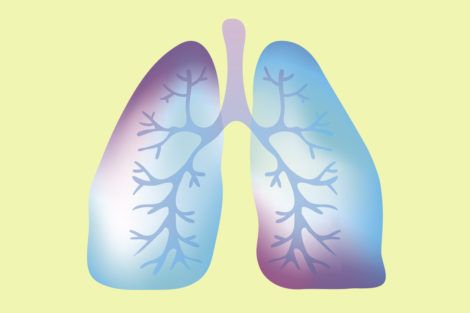However, study finds allergic asthma did not significantly increase the risk of severe illness
June 11, 2020–Adults with asthma who became infected with the coronavirus that causes COVID-19 were at higher risk of developing severe illness compared with adults who did not have asthma, according to a new study led by researchers at Harvard T.H. Chan School of Public Health and Massachusetts General Hospital.
The study, the first to specifically examine the longitudinal relationship between asthma and risk of developing COVID-19, also showed that the risk was largely driven by non-allergic asthma. Allergy-induced asthma, according to the findings, did not significantly increase the risk of severe illness.
A pre-proof of the study was published online in The Journal of Allergy and Clinical Immunology on June 6, 2020.
“Despite reasonable speculation that asthma could be a risk factor for severe COVID-19, rigorous, population-based research is needed to know whether asthma and its major subtypes actually increase risk,” said Liming Liang, corresponding author of the study and associate professor of statistical genetics at Harvard Chan School. “Based on these new findings, clinicians can improve risk-stratification and target COVID-19 prevention in patients with asthma, particularly those with non-allergic asthma.”
Since the start of the pandemic, clinicians have suspected that patients with asthma have increased susceptibility to COVID-19, but no longitudinal studies have analyzed the actual risk. For the new study, the research team analyzed data from 492,768 participants in the UK Biobank, which stores biologic samples from participants and is linked to their medical records. The researchers found 65,677 participants had asthma and 641 patients had severe COVID-19.
After adjusting for age, sex, body mass index, and other factors, the researchers found that having non-allergic asthma increased the risk of severe COVID-19 by as much as 48%. They also found that the risk of severe COVID-19 increased by as much as 82% among people with asthma and chronic obstructive pulmonary disease. Importantly, however, the study showed that people with allergic asthma had no statistically significant association with severe COVID-19.
Zhaozhong Zhu, first author of the study and a research fellow at Harvard Chan School, noted that “the new findings are consistent with recent studies that have shown low levels of receptors for novel coronavirus (SARS-CoV-2) on the airway cells of individuals with allergic diseases and asthma.”
The findings are especially important amidst allergy season, said study co-author Kohei Hasegawa, a physician at Massachusetts General Hospital’s Department of Emergency Medicine. “This study should provide some reassurance during allergy season to the tens of millions of people with allergic asthma,” Hasegawa said.
Funding for this study came from National Institutes of Health grant R01 AI-127507.
“Association of asthma and its genetic predisposition with the risk of severe COVID-19,” Zhaozhong Zhu, Kohei Hasegawa, Baoshan Ma, Michimasa Fujiogi, Carlos A. Camargo,and Liming Liang, The Journal of Allergy and Clinical Immunology, June 6, 2020, doi: https://doi.org/10.1016/j.jaci.2020.06.001
Photo: iStock
